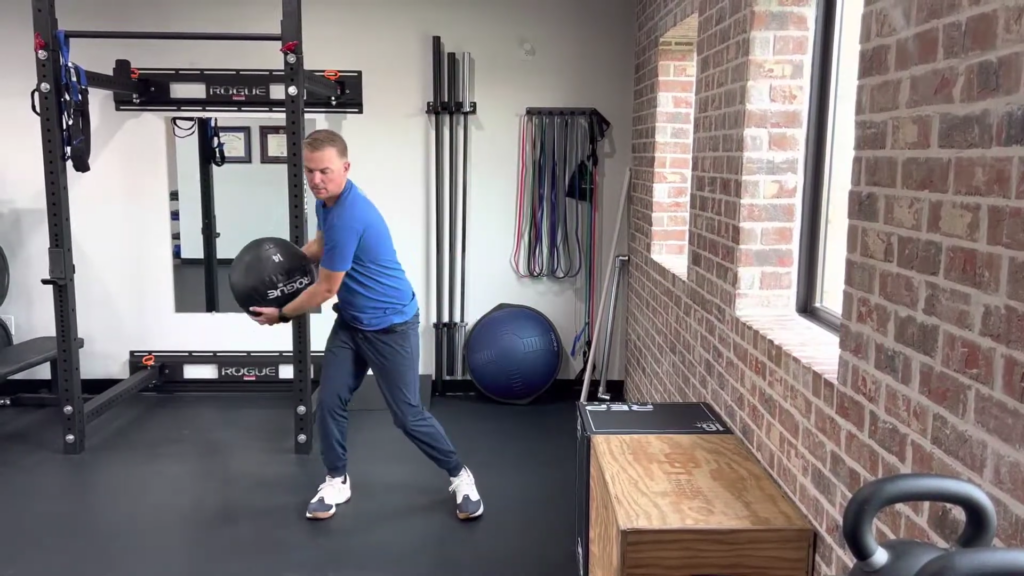These Rugby shoulder exercises will keep you tackling and injury-free. Let’s dive right into it.
If you are a rugby player, then your shoulders are your moneymakers.
They are the ultimate workhorses in every scrum, tackle, and pass.
The only catch is they happen to be some of the best candidates for injuries, as well.
So, how do we bulletproof these bad boys?
Understanding Rugby Shoulder Biomechanics
Assess those shoulders first, let’s zoom in on what is going on within those shoulders of yours.
The rotator cuff muscles are the ones working overtime in this task (they’re responsible for stabilizing your shoulder).
Think of it as your shoulder’s personal bodyguard.
When you’re smashing into opponents or reaching for that perfect lineout catch, your rotator cuff is working overtime.
But it’s not only the rotator cuff.
This means your deltoids, trapezius, and scapular muscles are getting a workout as well.
Top Shoulder Exercises for Injury Prevention
And now, for the tasty bits — the exercises that will transform those shoulders of yours into a pair of impenetrable Iron Walls!
1. Rotator Cuff Strengthening
Remember Jonny Wilkinson‘s laser-precise kicks?
Well, his shoulder strength was just as impressive.
Here’s a go-to exercise:
- External Rotation with Resistance Band
- Stand sideways to a wall, holding a resistance band at waist height
- Keeping your elbow tucked to your side, rotate your arm outwards
- Slow and controlled, mate – quality over quantity
This move targets those small but crucial rotator cuff muscles.
2. Scapular Stability Drills
Next up, let’s talk about scapular stability.
Your shoulder blades need to be rock-solid for tackle-ready shoulders.
Try this:
- Scapular Retraction
- Stand tall, arms by your sides
- Pull your shoulder blades together and try to hold a pencil between them
- Hold for 5 seconds, then release
Do this regularly, and you’ll be setting yourself up for fewer injuries and more dominant tackles.
3. Shoulder Mobility Exercises
First and foremost, rugby is a game of mobility – anyone who knows anything about Dan Carter understands this.
His fluid movements on the field? That’s all about shoulder mobility.
Give this a go:
- Wall Slides
- Stand with your back against a wall
- Slide your arms up the wall, keeping them in contact at all times
- Go as high as you can without arching your back
This exercise improves overhead shoulder strength and mobility – crucial for those lineout jumps.
4. Resistance Band Workouts
Resistance bands are your new best friend.
They’re portable, versatile, and perfect for rugby-specific shoulder workouts.
Try this shoulder press variation:
- Stand on a resistance band, holding the ends at shoulder height
- Press up, just like you would with dumbbells
- The band adds extra resistance as you reach the top of the movement
This exercise hits your deltoids and upper traps, key players in shoulder stability.
Incorporating Exercises into Training Routine
Now, you might be thinking, “Great exercises, but when do I do them?”
To be honest: include them in your warm-up.
Complete these drills before hitting the pitch for 10 – 15 minutes.
It’s like a pre-game locker-room pump-up rally for your shoulders.
During the season, focus on maintenance.
2-3 times a week, hit these exercises hard.
Off-season?
That’s when you build serious strength.
Up the intensity and frequency, but always listen to your body.
Additional Injury Prevention Strategies

Exercises are just part of the puzzle.
Proper tackling technique is crucial.
Work with your coach on perfecting your form.
Balance is key too.
Don’t just focus on your shoulders – a strong core and legs will take some pressure off those hardworking shoulders.
And remember, recovery is where the magic happens.
Rest, good nutrition, and maybe even some yoga – your shoulders will thank you.
Dr. James Andrews, the go-to guy for sports injuries, always emphasizes the importance of balanced training and adequate rest.
Listen to the pro — your body needs time to heal and repair.
Remember, these shoulder exercises for rugby aren’t just about preventing injuries.
They’re about making you a better, stronger player.
So, get to it and watch your game transform.
Your tackle-ready shoulders are waiting to dominate the pitch.
Expert Opinions and Research Findings
As of September 2024, the rugby world continues to evolve, and so does our understanding of injury prevention. So, we are going to dive into some expertise and research from recent times.
World Rugby’s Latest Guidelines
World Rugby, you might remember it as the International Rugby Board (IRB), has announced new player welfare guidelines. They’ve put a strong emphasis on shoulder-specific training, particularly for youth players. Their research shows that players who incorporate regular shoulder exercises reduce their risk of shoulder injuries by up to 40%.
The “Tackle-Ready” Program
The Rugby Football Union (RFU), which governs the sport in England, has launched a new program called “”Tackle-Ready”” designed to teach shoulder strength and how to properly tackle. In conjunction with leading physiotherapists and former players including Dan Carter the program shows strong evidence of reducing shoulder injuries across both amateur, professional levels.
Proprioception Training
Journal of Strength and Conditioning Research: Your joints are the most well-trained parts of your body, draws from recent research to flesh out the details; the shoulder girdle, for example, is almost entirely dependent on proprioception training to fuel its bracing prowess. This enables you to better tell where your shoulder is in space, which means that you can move and control it more efficiently which plays an integral part in reducing the risk of injury.
Try this exercise:
- Shoulder Alphabet
- Stand with your arm straight out to the side
- Use your finger to “draw” the alphabet in the air
- Keep your shoulder blade stable throughout
This simple yet effective drill enhances shoulder joint awareness and control.
The Role of Sleep in Shoulder Recovery
A groundbreaking study conducted at Eden Park’s high-performance center has revealed the crucial role of sleep in shoulder recovery and injury prevention. Players who consistently got 8-9 hours of quality sleep showed significantly lower rates of shoulder impingement and overuse injuries.
Technology in Shoulder Injury Prevention
Wearable technology is making waves in rugby training. New smart shirts with embedded sensors can now track shoulder movement patterns and stress levels during training and matches. This data helps coaches and physios identify potential injury risks before it turns into something serious.
Advanced Shoulder Exercises for Elite Players

For those looking to take their shoulder training to the next level, here are some advanced exercises used by top players:
1. TRX Y-T-I Series
- Using TRX straps, perform Y, T, and I arm movements
- Focus on controlled movements and scapular retraction
- This exercise mimics the diverse shoulder movements in rugby while providing stability challenges
2. Medicine Ball Wall Slams
- Stand facing a wall, holding a medicine ball at chest height
- Slam the ball against the wall and catch it on the rebound
- This explosive movement improves shoulder power and reactive strength
3. Landmine Press
- Set up a barbell in a landmine attachment or corner
- Press the bar up and slightly forward, mimicking a tackle motion
- This exercise builds shoulder strength in a rugby-specific movement pattern
Nutrition for Shoulder Health
Don’t forget about nutrition! Recent research has shown that certain nutrients play a crucial role in shoulder health and recovery:
- Omega-3 fatty acids: Reduce inflammation and support joint health
- Vitamin D: Essential for bone health and muscle function
- Collagen: Supports connective tissue strength
Consider incorporating these into your diet through food sources or supplements, under the guidance of a sports nutritionist.
Conclusion
Don’t forget that dedicated shoulder training it’s not just about injury prevention, it’s about increasing your performance gains in rugby. By incorporating these shoulder exercises, staying updated with the latest research, and taking a holistic approach to shoulder health, you’re setting yourself up for a long and successful rugby career.
Whether you’re playing at Twickenham Stadium, Eden Park, or your local club, these shoulder exercises and strategies will help you stay at the top of your game.